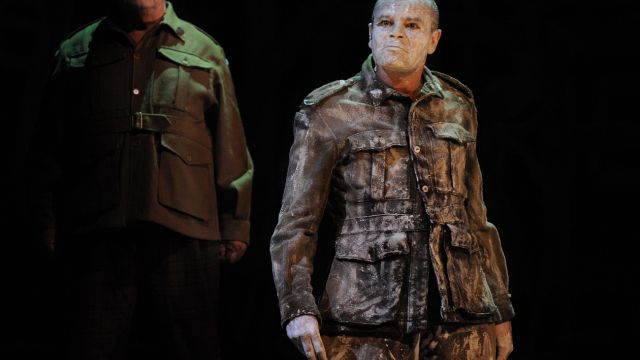Black Diggers
The first sound that rang out at the official ANZAC Day dawn service in Canberra on April 25 (today) was a didgeridoo. Those who heard it said it was reminiscent of gun shots. It’s a powerful symbol of how far we have come as a nation in recognising Indigenous Australians, and specifically, the Indigenous men who served in WWI at Gallipoli, and other battlefields in France, Belgium and Palestine.
Black Diggers is an evocative play with a fine cast of actors who perform at a cracking pace across countless scenes, depicting young Indigenous men who leave their ancestral homes to serve for a country that doesn’t recognise them as citizens.
The early scenes are full of warmth and humour, as the men convince themselves, their mates, families and the armed forces that they belong in uniform. They believe the War will set things right – they’ll be paid, they will have status, they will be admitted into Australian society, they’ll become men. One of the great tragedies for these soldiers is that many of them were granted all of these things while they were serving overseas, only to lose it all on their return – and much more besides.
 The script by Tom Wright is richly detailed, with dialogue full of Australian slang and phrases that sound authentic. When a returned soldier tells you his hand was “twitching like a dying budgee”, you believe it. Stephen Curtis has created a blackboard-like set upon which the ensemble continually writes the names of Indigenous soldiers, key dates and battlefields, as the scenes roll on. The set is floodlit, casting deep shadows, creating a tomb-like atmosphere.
The script by Tom Wright is richly detailed, with dialogue full of Australian slang and phrases that sound authentic. When a returned soldier tells you his hand was “twitching like a dying budgee”, you believe it. Stephen Curtis has created a blackboard-like set upon which the ensemble continually writes the names of Indigenous soldiers, key dates and battlefields, as the scenes roll on. The set is floodlit, casting deep shadows, creating a tomb-like atmosphere.
Director Wesley Enoch, together with a fantastic cast, keeps the audience on high alert. Gunshots ring out, rifles are lifted, characters are shot at, or shoot at others. In one nervous moment, the cast stand in their distinctive ANZAC uniforms across the entire stage, guns at the ready. You could almost sense audience members getting ready to duck.
Above all, it’s the cast that makes Black Diggers an unforgettable experience. It seems unfair to single out one actor but one of the play’s most brilliant moments belongs to Luke Carroll. His lengthy monologue of a fallen soldier who rises from the battlefield is sensational. His voice trembles and booms across the theatre, and all eyes are on his twitching hand and sorrowful face. It’s a striking effect, particularly as he talks about the horrors of war in a very Australian way – he could be someone’s granddad. Carroll’s performance towards the end of the play, as a returned serviceman who has to – literally – wear the prejudices of the country he fought for, is a strong final image.
Black Diggers has serious intentions, but there is surprising delight, intimacy and joy there, too, thanks to the efforts of everyone involved.
Sara Bannister
Images by Branco Gaica.
Subscribe to our E-Newsletter, buy our latest print edition or find a Performing Arts book at Book Nook.

